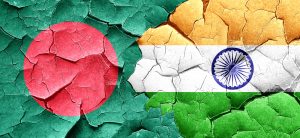Bangladesh’s cricket team was not among the two teams that played in the final of this year’s Cricket World Cup. However, cricket fans in Bangladesh turned their enthusiasm instead toward rooting against the Indian cricket team.
On November 19, when the Australian cricket team won the final match against India, it was like a festival in Bangladesh. Thousands gathered at the Dhaka University campus and chanted slogans against the Indian team. On Facebook, many commented that this day was like the Eid for them (Eid is the most significant festival in Muslim-majority Bangladesh). The Indian newspaper India Today reported videos of Bangladeshi people celebrating India’s defeat, which went viral in Bangladesh and India.
The anti-Indian sentiment in Bangladesh is not only limited to the Indian cricket team. People in this Muslim-majority neighbor of India are turning increasingly anti-Indian. This phenomenon of anti-Indian sentiment has been visible in Bangladesh for quite some time. In 2011, then-Indian Prime Minister Dr. Manmohan Singh commented that 25 percent of Bangladeshi are anti-Indian. There is no survey about the current figures. However, anyone who knows Bangladesh would acknowledge that anti-Indian sentiment has increased significantly in recent years.
Several reasons can be cited for that. The anti-Muslim rhetoric of Bhartiya Janata Party (BJP) leaders must be one of them. But the most crucial reason is India’s backing of the ruling political party, the Awami League, which has been in power for the last 15 years in Bangladesh thanks to two disputed elections.
If you talk to any activist of the opposition Bangladesh Nationalist Party (BNP), they will tell you that the AL was able to rule for 15 years only because of India’s backing. This was reflected in the statement of a key leader, Ruhul Kabir Rizvi the senior joint secretary general of the BNP, who claimed that India has “taken a stance against the people of Bangladesh” by supporting the “authoritarian government” of Prime Minister Sheikh Hasina. It is apparent that the opposition parties in Bangladesh are not happy with India’s approach to Bangladeshi politics.
Are India’s Bangladesh policies fueling anti-Indian sentiment? And is it harming India’s long-term security goals in the region? Indian policymakers might consider re-assessing its Bangladesh policies with the recent political developments in Maldives in mind. The election results and debate over the presence of the Indian military in Maldives are another sign that the peoples in India’s neighbors are uncomfortable with India’s perceived interference in their domestic politics.
Soon after the election in Maldives in September, a key foreign affairs adviser of the newly elected Maldivian president told an Indian news portal that India is the most significant stakeholder in the Indian Ocean region. Mohamed Hussain Shareef, the Progressive Party of Maldives (PPM) secretary, told The Wire that India should not be worried that the new government would be hostile to New Delhi.
The negative reaction to the news item on X, formerly Twitter, manifested the deep-rooted anti-Indian sentiment among Maldivian youths. Some even wrote on X that they would withdraw support from the new government if it failed to ask India to withdraw its troops.
The president-elect, Mohamed Muizzu, is fully aware of his support base’s anti-Indian sentiment and, a day later, clearly conveyed his message to India. He said he would begin efforts to remove Indian troops from day one. He reiterated this after taking his oath on November 17.
India has a small military presence – an estimated 75 troops, mainly technicians and pilots – stationed in Maldives. However, many Maldivians do not believe in India’s claim that the military presence is for humanitarian purposes and consider it a threat to their sovereignty.
The “India Out” campaign orchestrated by the Progressive Party of Maldives (PPM) and Muizzu’s People’s National Congress (PNC) was a direct response to the “India First” policy carried out by the former president, Ibrahim Solih, who prioritized Indian investment and military cooperation and blocked Chinese investment and activities in Maldives. While “India Out” targeted New Delhi’s interference in Maldives, it was very much a manifestation of discontent with the Solih government; so much so that Solih instituted a controversial ban on the movement.
This is where Indian policymakers have a point to take. Much of the anti-Indian sentiment is essentially anti-government sentiment, with opposition supporters mainly fueling both movements. Since India is backing a political party in these countries, this anti-government sentiment is turning into an anti-Indian sentiment.
This becomes even more of a problem when pro-Indian political parties in India’s neighboring countries use violence against their political opponents. In Bangladesh, police raids of opposition activists’ houses, mass arrests, and attacks on peaceful protests of opposition parties have become everyday affairs. Human rights activists are often arrested, and journalists are intimidated. Human Rights Watch said in a report that the government and its supporters had reportedly targeted 56 journalists in the first three months of 2023 alone. India’s silence on these abuses is taken as tacit consent at best and blatant support at worst.
The geopolitical position of India is crucial and its influence in key organizations in Bangladesh is deep. If New Delhi wants, it can hold the AL to account for the democratic backsliding seen in the country under Hasina’s rule. So far, India seems to have made the calculation that its interest are better served by propping up the Awami League. And it may be that the ruling party can continue to power for a considerable time, even without any participatory elections.
However, the opposition party, the BNP and its support base are not going anywhere. Even if the BNP ceases to exist following the repression campaign, the anti-Indian public will remain. The youths who chant slogans against the Indian cricket team might grow to chant slogans against India itself.
Backing an increasingly unpopular government in Bangladesh and letting it suppress the opposition parties may have benefits in the short term, but Indian policymakers should consider the long-term damage being done.

































